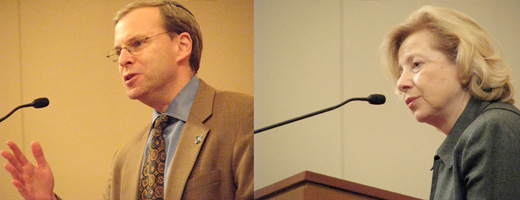By MORDECAI SPECKTOR
A few minutes before the start of J Street Minnesota’s first public forum on Wednesday night, the partition at the back of the Mount Zion sanctuary was opened to allow for more seating.
It was a large crowd that heard Israeli Amb. Colette Avital and J Street founder and president Jeremy Ben-Ami address the prospects for movement toward a resolution of the long-running state of hostilities between Israel and the Palestinian people. The title of the event, which J Street’s Minnesota chapter billed as a “conversation” for Jews with various views on Mideast issues, was “Achieving Two-States: Why the Security of Israel Depends On It.”

“The only way Israel makes it to another 62 years is to reach a two-state solution to the Israeli-Palestinian conflict,” Ben-Ami said at the beginning of the evening. He was introduced by Andy Luger, chair of the event.
Rabbi Amy Eilberg, J Street Minnesota chair, delivered closing remarks and conducted a Q&A with the featured speakers.
J Street promotes itself as the “political home for pro-Israel, pro-peace Americans,” and lobbies for strong American leadership toward achieving a two-state solution to the Israeli-Palestinian conflict, and for a “broad debate” on Israel and Middle East issues, both nationally and within the American Jewish community.
The former domestic policy advisor in the Clinton administration mentioned that the JStreetPAC (Political Action Committee) had contributed $1.3 million to federal candidates in this election cycle. Two of the PAC’s endorsed candidates were in the audience: Reps. Betty McCollum and Keith Ellison.
While offering praise for the achievements of the traditional pro-Israel activists in the American Jewish community, Ben-Ami noted that the “more hawkish elements of our community” have allied themselves with Christian evangelicals and neo-conservatives whose views generally don’t resonate with the 78 percent of American Jews who voted for Barack Obama in 2008.
“It is J Street’s view that the gap between the louder establishment voices that speak for and control communal debate on Israel, and the opinions and views of the broader population of Jewish Americans has had a startling and negative impact in three ways: one, on American policy; two, on Israel itself; and three, on our community,” said Ben-Ami.
“Here in the United States, politicians and policy makers have drawn the lesson that to get American Jewish political support, votes as well as donations, they need to adopt an Israel right-or-wrong approach when it comes to the Middle East,” he added.
Turning to the tenuous state of direct Israeli-Palestinian talks, Ben-Ami said that the “most urgent threat Israel faces” is in the failure to resolve the conflict with the Palestinians.
In her remarks, Colette Avital, who has served both in Israel’s foreign service and as a Labor Party member of the Knesset, said that Israel has a chance to conclude a peace deal with the Palestinians, and normalize relations with the 22 Arab states that have signed on to the 2002 Arab Initiative, which is sometimes referred to as the Saudi Plan.
“I believe that this is a sea change in the Middle East, and we have to take advantage of it,” she said. “I’m not saying that peace is around the corner, and I’m not saying that peace is easy to achieve. I’m saying that the circumstances have changed, that there is realism.”
At the same time, she acknowledged that Islamic religious fundamentalism — some of which is nurtured by Iran — is growing. She said that this trend “is dangerous, it is dangerous not only to the State of Israel… it is probably more dangerous to the Arab regimes” in the Middle East.
Echoing Ben-Ami’s comments, Avital stressed the importance of American agency to use whatever means are available to ensure that the Israelis and Palestinians successfully conclude peace negotiations. If Israel fails in its quest for peace, and ends up ruling over two and a half million Palestinians on the West Bank, “that will be the end of the Zionist enterprise.”



















